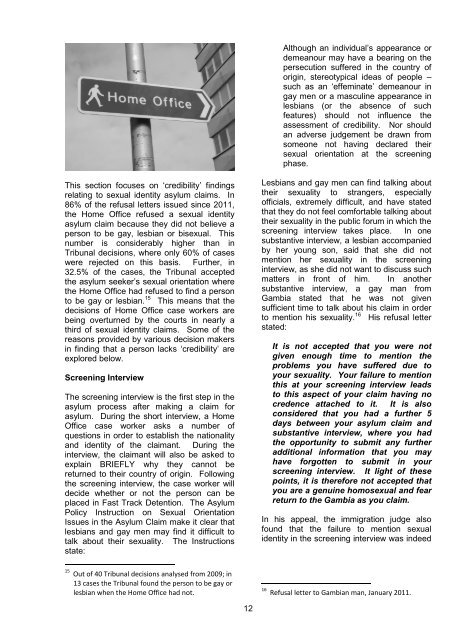Missing-the-Mark
Missing-the-Mark
Missing-the-Mark
Create successful ePaper yourself
Turn your PDF publications into a flip-book with our unique Google optimized e-Paper software.
Although an individual’s appearance or<br />
demeanour may have a bearing on <strong>the</strong><br />
persecution suffered in <strong>the</strong> country of<br />
origin, stereotypical ideas of people –<br />
such as an ‘effeminate’ demeanour in<br />
gay men or a masculine appearance in<br />
lesbians (or <strong>the</strong> absence of such<br />
features) should not influence <strong>the</strong><br />
assessment of credibility. Nor should<br />
an adverse judgement be drawn from<br />
someone not having declared <strong>the</strong>ir<br />
sexual orientation at <strong>the</strong> screening<br />
phase.<br />
This section focuses on ‘credibility’ findings<br />
relating to sexual identity asylum claims. In<br />
86% of <strong>the</strong> refusal letters issued since 2011,<br />
<strong>the</strong> Home Office refused a sexual identity<br />
asylum claim because <strong>the</strong>y did not believe a<br />
person to be gay, lesbian or bisexual. This<br />
number is considerably higher than in<br />
Tribunal decisions, where only 60% of cases<br />
were rejected on this basis. Fur<strong>the</strong>r, in<br />
32.5% of <strong>the</strong> cases, <strong>the</strong> Tribunal accepted<br />
<strong>the</strong> asylum seeker’s sexual orientation where<br />
<strong>the</strong> Home Office had refused to find a person<br />
to be gay or lesbian. 15 This means that <strong>the</strong><br />
decisions of Home Office case workers are<br />
being overturned by <strong>the</strong> courts in nearly a<br />
third of sexual identity claims. Some of <strong>the</strong><br />
reasons provided by various decision makers<br />
in finding that a person lacks ‘credibility’ are<br />
explored below.<br />
Screening Interview<br />
The screening interview is <strong>the</strong> first step in <strong>the</strong><br />
asylum process after making a claim for<br />
asylum. During <strong>the</strong> short interview, a Home<br />
Office case worker asks a number of<br />
questions in order to establish <strong>the</strong> nationality<br />
and identity of <strong>the</strong> claimant. During <strong>the</strong><br />
interview, <strong>the</strong> claimant will also be asked to<br />
explain BRIEFLY why <strong>the</strong>y cannot be<br />
returned to <strong>the</strong>ir country of origin. Following<br />
<strong>the</strong> screening interview, <strong>the</strong> case worker will<br />
decide whe<strong>the</strong>r or not <strong>the</strong> person can be<br />
placed in Fast Track Detention. The Asylum<br />
Policy Instruction on Sexual Orientation<br />
Issues in <strong>the</strong> Asylum Claim make it clear that<br />
lesbians and gay men may find it difficult to<br />
talk about <strong>the</strong>ir sexuality. The Instructions<br />
state:<br />
Lesbians and gay men can find talking about<br />
<strong>the</strong>ir sexuality to strangers, especially<br />
officials, extremely difficult, and have stated<br />
that <strong>the</strong>y do not feel comfortable talking about<br />
<strong>the</strong>ir sexuality in <strong>the</strong> public forum in which <strong>the</strong><br />
screening interview takes place. In one<br />
substantive interview, a lesbian accompanied<br />
by her young son, said that she did not<br />
mention her sexuality in <strong>the</strong> screening<br />
interview, as she did not want to discuss such<br />
matters in front of him. In ano<strong>the</strong>r<br />
substantive interview, a gay man from<br />
Gambia stated that he was not given<br />
sufficient time to talk about his claim in order<br />
to mention his sexuality. 16 His refusal letter<br />
stated:<br />
It is not accepted that you were not<br />
given enough time to mention <strong>the</strong><br />
problems you have suffered due to<br />
your sexuality. Your failure to mention<br />
this at your screening interview leads<br />
to this aspect of your claim having no<br />
credence attached to it. It is also<br />
considered that you had a fur<strong>the</strong>r 5<br />
days between your asylum claim and<br />
substantive interview, where you had<br />
<strong>the</strong> opportunity to submit any fur<strong>the</strong>r<br />
additional information that you may<br />
have forgotten to submit in your<br />
screening interview. It light of <strong>the</strong>se<br />
points, it is <strong>the</strong>refore not accepted that<br />
you are a genuine homosexual and fear<br />
return to <strong>the</strong> Gambia as you claim.<br />
In his appeal, <strong>the</strong> immigration judge also<br />
found that <strong>the</strong> failure to mention sexual<br />
identity in <strong>the</strong> screening interview was indeed<br />
15 Out of 40 Tribunal decisions analysed from 2009; in<br />
13 cases <strong>the</strong> Tribunal found <strong>the</strong> person to be gay or<br />
lesbian when <strong>the</strong> Home Office had not.<br />
16 Refusal letter to Gambian man, January 2011.<br />
12


